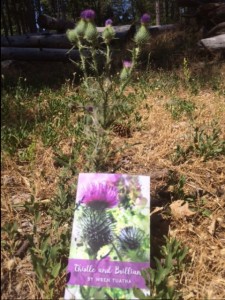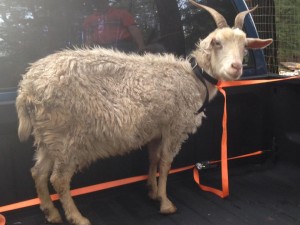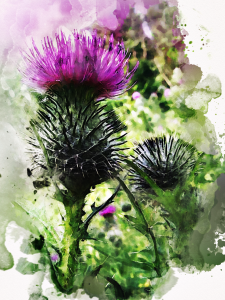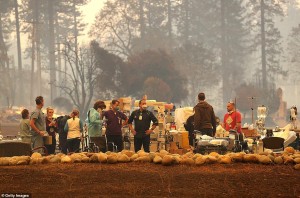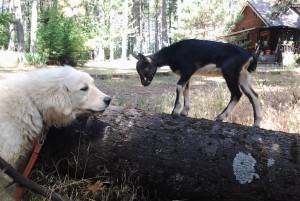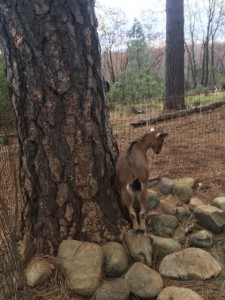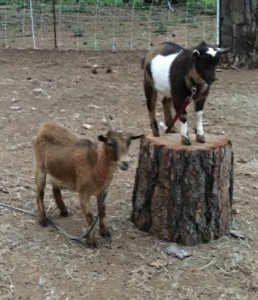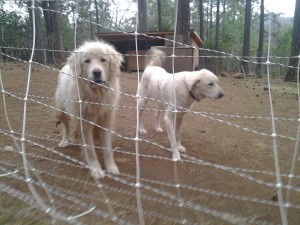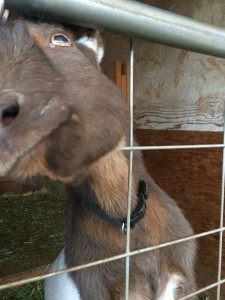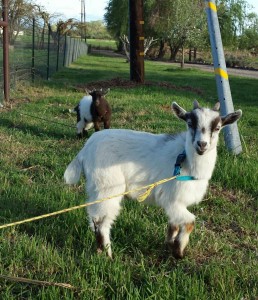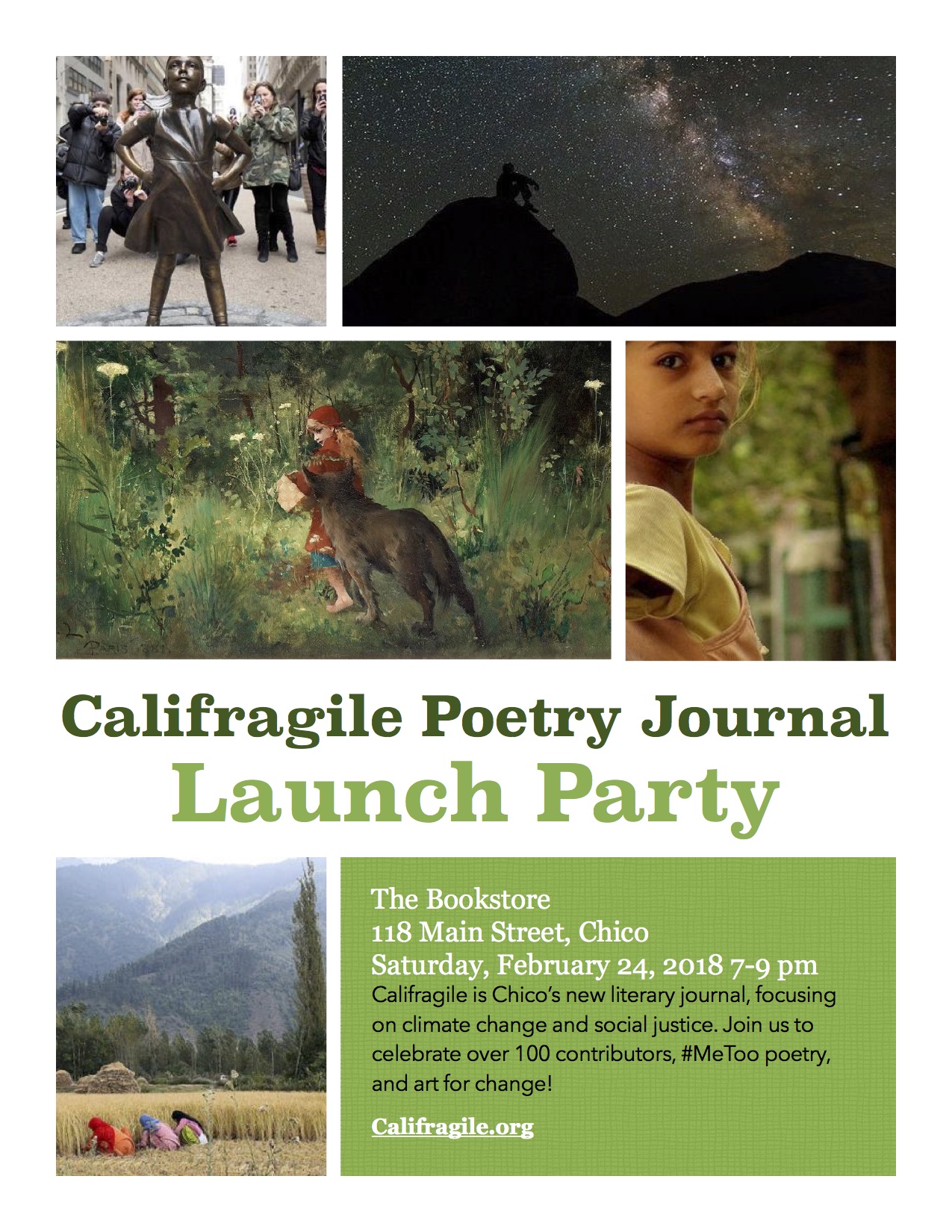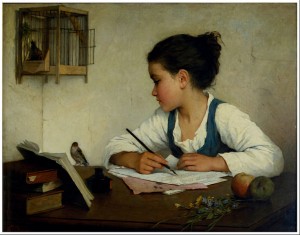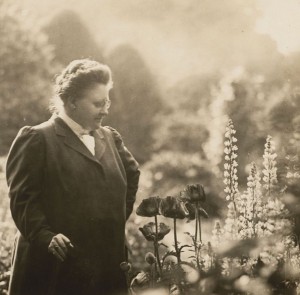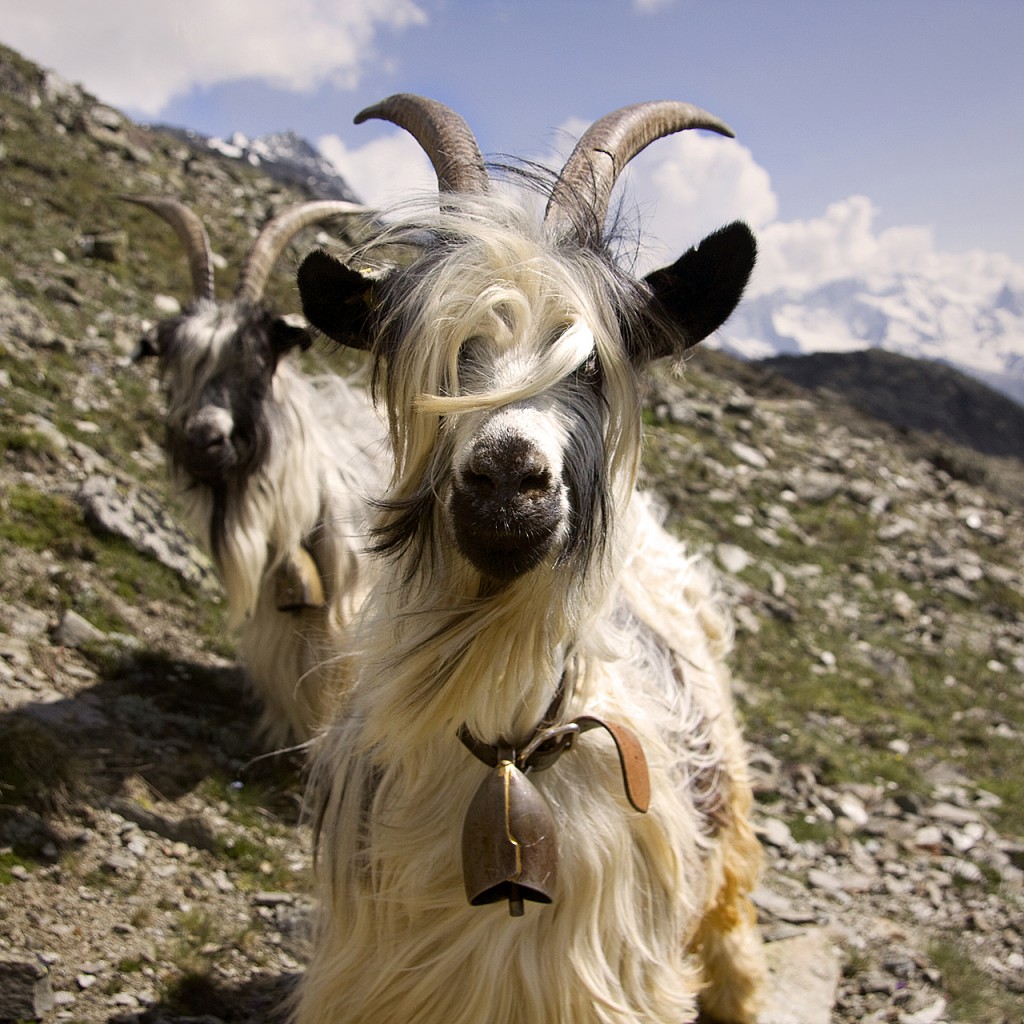Thistle and Brilliant is Finally a Thing Made of Paper!
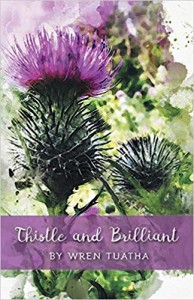 It’s like losing virginity. It’s one of those life milestones, a graduation, a marriage, buying a first home. At fifty-three, I’m holding my first published book in my hands. It’s been a lifelong dream. I guess I’m a late bloomer, but I have no complaints!
It’s like losing virginity. It’s one of those life milestones, a graduation, a marriage, buying a first home. At fifty-three, I’m holding my first published book in my hands. It’s been a lifelong dream. I guess I’m a late bloomer, but I have no complaints!
My thanks to Leah Maines, Christen Kincaid, and all the elves at Finishing Line Press. Although this is a chapbook, you’ve taken the effort to produce a beautiful object.
And let’s never stop raving about Jenn Zed’s amazing painting on the cover! Some readers may know Jenn’s work from Califragile. I often pair her art with various poets there. Jenn is a poet, herself.
The day my first box of copies arrived, C.T. noticed a thistle with four purple blossoms growing along our driveway. They look exactly like Jenn’s cover art.
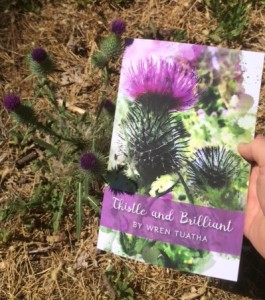 If you pre-ordered a copy through me or Finishing Line Press and gave your address, you’ll be getting your copy in the next couple of weeks. FLP as advised me that if you have questions or think your order might be lost, you should contact them, the publisher, not the author. Email them here:
If you pre-ordered a copy through me or Finishing Line Press and gave your address, you’ll be getting your copy in the next couple of weeks. FLP as advised me that if you have questions or think your order might be lost, you should contact them, the publisher, not the author. Email them here:
MissingBookOrders@finishinglinepress.com
If you pre-ordered through me and didn’t give your address, I’ll be contacting you this week to deliver it.
If you are in the Butte County area and want to take advantage of the “danish rebate,” then contact me when your copy arrives and we’ll schedule a date at the coffee house of your choice. You need to initiate in order for this to happen.
I’ll post later with upcoming promotional events!
Subscribe to this blog's RSS feed
Pippin & Simile: Love Makes a Family
There are clues to her history, but no one know for certain. She was found wandering Skyway, the main artery that runs the length of Paradise Ridge. She was loose in Magalia, an area of thick Ponderosa pine forest. Unknown persons corralled her and brought her to a family nearby who had two 4H male Boer goat kids.
We named her Peregrine Finale, Pippin for short. Peregrine means traveler; Finale to signal that this is her last destination. She’s an elderly cashmere goat, bred for fiber. Judging from her teeth, and lack of them, she could be from eight to eighteen. When she arrived at her foster family, they thought she was close to giving birth. But as days passed, they realized she had already birthed, probably while feral. One can only guess the fate of her kid. Was it stillborn, due to her poor condition? Taken by a predator? Did her previous owner keep the kid and turn Pippin out? We’ll almost certainly never know. Pippin’s right ear has two holes for eartags and a gap slicing through them. She has probably been to auction at least that many times.
Her health and overall condition were very poor. She was malnourished and in considerable pain from arthritis, and also foot rot, probably resulting from being confined in unclean conditions. Her sought-after fiber was matted, dull, and full of debris. She was generally passive and disliked attention, especially touch.
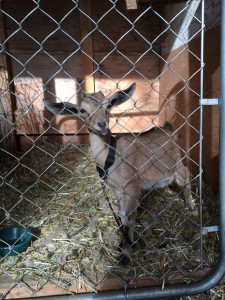 The day before Pippin was scheduled to be transported to The Seldom Herd, we welcomed an eight week old doeling, one of triplets who had been rejected by her mother after she nearly drowned in a vat of used motor oil. Moving past how someone let that happen…She had recovered but she was a runt for her mini-Nubian/Nigerian Dwarf mix. Her first humans had made lemonade of her situation and named her Olive. Rather than have her forever identified with one terrible moment of her life, we renamed her Simile, because I’m a poet, she’s a Heinz 57 of a goat, and it’s just a fun word. (Having trouble? Rhymes with Emily…)
The day before Pippin was scheduled to be transported to The Seldom Herd, we welcomed an eight week old doeling, one of triplets who had been rejected by her mother after she nearly drowned in a vat of used motor oil. Moving past how someone let that happen…She had recovered but she was a runt for her mini-Nubian/Nigerian Dwarf mix. Her first humans had made lemonade of her situation and named her Olive. Rather than have her forever identified with one terrible moment of her life, we renamed her Simile, because I’m a poet, she’s a Heinz 57 of a goat, and it’s just a fun word. (Having trouble? Rhymes with Emily…)
Actually, at first, we thought to call her Seti, after the Search for Extra Terrestrial Intelligence, because, with her comical ears and long, dark eyes, she looked a bit alien. But then we’d spend her whole life explaining that to people, which never happens with the name Simile…
We start new recruits in our nursery pen, no matter their age. There we supervise visits with one Seldom Herd goat at a time, as well as the Livestock Guardian Dogs. Goats often arrive with little experience with dogs, much less guardians the size of bears who are excited to smell up new recruits! As they adjust, we supervise them in the outer pen and try to control their discovery of the electric netting, so that they don’t mistake a dog or goat for being the cause of their unpleasant jolt.
We planned to pair Pippin and Simile with each other, hoping Pippin would adopt Simile, replacing the relationships they’d lost. It worked wonderfully! Pippin had a lot of healing to do so she was reserved at first. But we addressed her hooves, matted coat, and arthritis pain with our vet and, with ongoing pain killers, Pippin really pepped up!
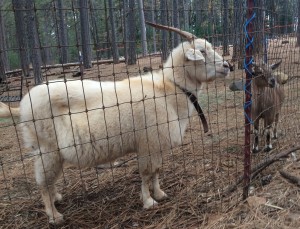 The two are now mother and daughter and will be together to the end. Little runt Simile has grown long-legged and tall. Pippin seems to be aging in reverse. She’s become the queen goat and actually runs up and down the slope with the others, joining in goat games. She’s a dutiful monarch to all our goats, but Simile is her heir apparent. Pippin still ushers her to the best browse and swipes her horns to shoo others away. They bed down together. While I comb, cut and brush out Pippin’s fiber, Simile is a satellite around us, nibbling on my shirt and restless for her turn!
The two are now mother and daughter and will be together to the end. Little runt Simile has grown long-legged and tall. Pippin seems to be aging in reverse. She’s become the queen goat and actually runs up and down the slope with the others, joining in goat games. She’s a dutiful monarch to all our goats, but Simile is her heir apparent. Pippin still ushers her to the best browse and swipes her horns to shoo others away. They bed down together. While I comb, cut and brush out Pippin’s fiber, Simile is a satellite around us, nibbling on my shirt and restless for her turn!
Thanks on My Last Days of Preorders
Many thanks to Finishing Line Press publisher Leah Maines and her staff! Despite losing four months of prep time to the Camp Fire, I have learned a lot in Thistle and Brilliant’s two month promotional period. FLP has been great, suggesting books to read on poetry promotion and tutoring me on press releases, print and radio interviews, and swag!
As I shift gears now, to a deeper edit of the next collection (Skeptical Goats), applying to Goddard’s MFA program, and envisioning possible T&B fall tours in Kentucky and the East Coast, I feel firmly supported by friends and family in my current and former homes. I think sentimentally of Kentucky, with a poem Leah once selected for FLP’s journal, Paddock Review. It first appeared in Canary, Literary Journal of the Environmental Crisis:
Tupelo Coyote
We were tracing Jack’s Creek
where the woods abducts it from the rolling
hills of dairy cows and tobacco.
I on the asphalt, you behind the tupelos.
You stalked me like a fan
afraid to ask for my autograph.
Those alien eyes,
calculating,
measuring my marrow
bend after turn, always
thirty paces aside.
Now you trot out in the farmlands,
legs like tobacco sticks, mapping the median line.
I am roadside, reading.
You are storybook real.
I speak to you, familiar,
as if you are the family dog.
Your answer is a glare-beam
that rips me, rights me.
You put me in the landscape,
that’s all.
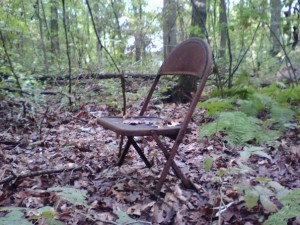 Wherever I’ve lived, as close as my relationships were, this solitude has often populated my poems. As I live in California, far from lifelong friends, as I submit a collection of poems called Heathcote, exploring my intentional community experience, I think of my ultimate solitude poem as being symbolic of my Maryland life, and my distance from it. Included in Thistle and Brilliant, I was honored to have this poem first appear in The Cafe Review:
Wherever I’ve lived, as close as my relationships were, this solitude has often populated my poems. As I live in California, far from lifelong friends, as I submit a collection of poems called Heathcote, exploring my intentional community experience, I think of my ultimate solitude poem as being symbolic of my Maryland life, and my distance from it. Included in Thistle and Brilliant, I was honored to have this poem first appear in The Cafe Review:
Folding Chair
I told you then I would take it out back
and kill it with a knife. But I couldn’t do it.
You stumbled upon my love today as then.
It’s a folding chair, forgotten in the woods,
rusting beside living oaks and rotting, jutting stumps,
unsuitable seats. Your mind tries to pick up its stories
from the air around. A picnicker, a hunter, absent minded
yogi. But stories are noise, excuses. Mute air transmits
this year’s bird noise, same as the moment before
and the moment after this chair was left here.
You realize the years, four legs grounded through
snow mounding and hurricanes, the inflating
and shriveling of mushrooms. Fox and mouse,
mouse and beetle, squirrel and squirrel.
Food and urges and panic. I remember loving you.
There was noise.
Mute, awake air, used to being taken in and released,
doesn’t suffer seasons or fools, doesn’t root for predator
or prey, doesn’t pray that you find your own heart
among curly, restless ferns. I still do.
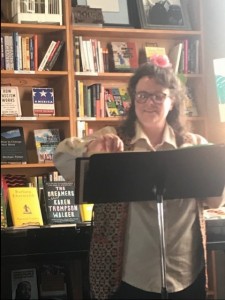
Wren at Not. Love. Poems., T&B event at Blackbird in Chico. Photo by Poemcrazy author Susan Wooldridge.
I still do! Hopefully I’ll visit the East Coast in the fall.
I found that folding chair in the woods of Heathcote and brought it to my cabin as an artifact. After photographing it a few times, one day I slipped on my icy porch steps, fell on it, and turned it into a rusty metal pancake. That wasn’t funny at the time, but now I smile.
If I set any records at FLP it may not be for copies sold but for most people thanked in my book. Some birthed me, literally and figuratively, some give endless feedback in critiquing groups, some donated to The Goat Boat that provided me with a workspace and then saved us all in the Camp Fire. When I see the galleys, I’ll probably want to squeeze in more names. I have asked a lot of my disparate community and you have answered with your usual candor mixed with love and a wink.
As a project person, asking is my job. So for almost the last time in T&B’s promo period, I’ll throw it out–If you haven’t ordered your copies, (and yes, wink-wink, if you’re this late I expect you to buy multiples!) please link to FLP’s T&B page or, if you prefer to order through me, contact me via email or Facebook by April 26th, 2019.
What Does the Title, Thistle and Brilliant, Mean?
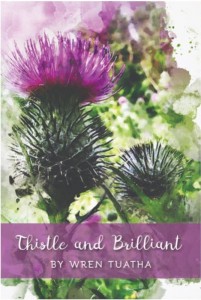 I’ve been asked this a couple of times at readings. Especially since the words are different parts of speech, and since I don’t always share the tiny title poem, I understand the curiosity. This poem sets the tone for the collection. Before it kicked off my chapbook, it was the lead-off poem in a spring themed edition of Midnight Circus. I love the cover of this journal, a nice watercolor of a skull holding plump flowers like a vase. That gives readers a clue that this is not going to be a lollipops and bumble bees treatment of spring. Then comes my poem to bring the point home:
I’ve been asked this a couple of times at readings. Especially since the words are different parts of speech, and since I don’t always share the tiny title poem, I understand the curiosity. This poem sets the tone for the collection. Before it kicked off my chapbook, it was the lead-off poem in a spring themed edition of Midnight Circus. I love the cover of this journal, a nice watercolor of a skull holding plump flowers like a vase. That gives readers a clue that this is not going to be a lollipops and bumble bees treatment of spring. Then comes my poem to bring the point home:
Thistle and Brilliant
Sweet Thistle, purple
and green. It looks
almost furry
in the brilliant
rising light.
It makes you want
to take it in hand,
despite all you know.
Muppets are such liars.
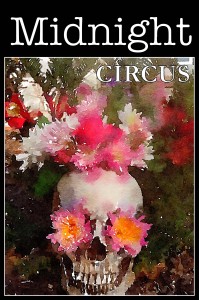 Like most of my poems, this avoids telling a narrative story in favor of letting images make my point. Yes, Thistle was once a lover of mine, this poem getting born at the moment I realized that was a bad idea. The last line, make the prickly Thistle into a muppet, even more cuddly on sight, came much later in rewrites.
Like most of my poems, this avoids telling a narrative story in favor of letting images make my point. Yes, Thistle was once a lover of mine, this poem getting born at the moment I realized that was a bad idea. The last line, make the prickly Thistle into a muppet, even more cuddly on sight, came much later in rewrites.
So, rather than my collection being love poems of adoration and longing, the reader knows right off the bat that these are poems of assessment and decision making, boundaries and negotiation.
In my mind, the narrator is the “brilliant rising light,” circling Thistle, flirting just a bit, keeping some distance. To me, they’re lovers/about to be/or not, thus Brilliant’s place in the title of the poem and the book. These are poems of the dance!
To order Thistle and Brilliant by Wren Tuatha, visit her page at Finishing Lin Press here.
I’m the Book of the Day!
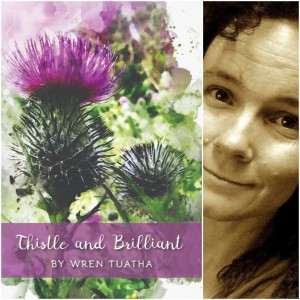 Today my publisher, Finishing Line Press, honors my poetry collection, Thistle and Brilliant, as their Book of the Day. How fun! This is a great opportunity for me to give more details about this book and its meaning to me.
Today my publisher, Finishing Line Press, honors my poetry collection, Thistle and Brilliant, as their Book of the Day. How fun! This is a great opportunity for me to give more details about this book and its meaning to me.
A few years ago, chronic health problems I’d been living with got worse. I moved to California and focused on healing with great support from C.T. At some point I realized not only that my condition had affected my brain and made communication and concentration difficult, but that I hadn’t written a single poem in five years. With a few publishing credits to my name and a long career as a performance poet, this was a significant part of my identity as writer/educator.
Not knowing if I would improve my health, I decided to curate my old poems into a manuscript, in the hope of at least getting a book of my free verse published in my lifetime. I pulled my poems out of a discarded hard drive and posted them in a few online critiquing forums. I sculpted and shaped them and started submitting.
As acceptances and rejections came in, I even threw together a submission to Finishing Line Press’ 2017 New Women’s Voices Chapbook Competition. From that submission, FLP actually offered me a publication deal! I had to confess to them that I’d only entered in the hope of winning the $1000 prize, as we were struggling financially and could use the prize for rent. At the time, with my health still poor, and having recently moved from all my East Coast contacts, I didn’t feel I could promote the book as their contract requires. So, bizarrely, I turned them down!
I kept submitting batches of poems to literary journals. With time on my hands and loads of feedback from critiquing forums, I published over sixty poems in a single year.
I learned more about the writing community when I accepted a position as editor of an online journal. The office politics there inspired me to found my own literary magazine, Califragile.
Working with poems, mine and others’, is like doing puzzles. It has been fantastic for healing my brain. As I edited and critiqued, I started to stab at writing new poems. It was awkward and slow. But eventually, I got back on the horse!
When the call came again, I entered the 2018 New Women’s Voices Chapbook Competition. This time FLP accepted two of my manuscripts for publication, Thistle and Brilliant, a collection of older poems, and Skeptical Goats, all new California poems! What a personal triumph for me. Not only did I succeed in my goal of getting a collection of my old poems in print, but I got a bonus prize I didn’t expect when I started–I’m a poet again!
Thistle and Brilliant, Poems of Relationships in Motion
These are not love poems, waxing in adoration. These are portraits of moments, narrators noticing as relationships start, end, dim or brighten, become uneven, save the day or never stand a chance. The pronouns are, shall we say, flexible, as am I. Some of these started as autobiographical, some are fiction, exploring interesting ideas. There are repeating characters and imagery, such as Mika, the wise little raccoon, plus watches and clocks, the micro and macro, and no collection of mine would be complete without mammoths, raccoons, wrens and Americans.
Cultural influences include The Accidental Tourist, #MeToo, and the scientific relationship between scent and memory.
The Camp Fire Will Not Win
About the time I would have started scheduling interviews, readings, house parties and other promotions for Thistle and Brilliant, the Camp Fire happened, forcing us to evacuate our home, destroying my partner’s business, and decimating and area around our neighborhood the size of Chicago. Even with our modest finances, I had planned to tour the East Coast and my home state of Kentucky. Instead, I was shoved inside an RV in a stranger’s front yard, breathing through a gas mask for weeks.
I managed to reconnect with poet Marge Piercy on a borrowed laptop. She was reading Thistle and Brilliant at the time of the Camp Fire, and writing an endorsement blurb. I sent her dispatches from the evacuation zone, eager to share details not covered in the media. Marge got it right when she wrote, “It sounds like you’re safe, but you’re safe in Hell.” Yep.
As we returned to our surviving house, surrounded by miles of scorched neighborhoods, I returned to the job of preparing for my book’s two month promotional period, a time for me to actively solicit preorders for my book. FLP takes this time as a good indicator of how large a press run they should plan. (As a first time poet/author, I am paid in a percentage of that press run, free copies for me to sell, gift, and submit for prizes and awards.)
It seemed strange after the horror and shock of the Camp Fire to invite people to buy a book of “love” poems with a big purple flower on the cover. But I was realizing a life goal. I didn’t want the Camp Fire to take this away from me, along with everything else it had consumed.
Instead of the grand tour I’d planned, I simply stayed in Butte County and on Facebook. I managed several public readings, three radio interviews and a number of house parties. I messaged, emailed, texted, and called friends and family. It’s not the splash I’d geared up for, but I feel it’s a strong showing despite the cinders!
Just Four Days Left!
If you have not ordered your copy of Thistle and Brilliant, please click here or get in touch with me. I would love to sell about forty more, so if you can add extras as gifts or donate one to your local library, that would be shiny! Please share my link on social media and email it to friends you think might be interested. Know any fledgling poets? I will critique three poems for each copy of T&B they order! Thank you for joining me in my publishing adventure!
Samples from Thistle and Brilliant
Cornbread
Cotton takes care of me.
I mend and wonder where
a word went as Cotton hops
out of bed, feeds the herd,
showers. I’m late with his
coffee. I have one job as he
capers around, clipboards
and clients’ keys, leash
and a dog to walk.
My hours pass in turns of
whiplash and molasses.
I’m glad he’s at work,
not watching. We both recall
when I was brilliant.
He soldiers and I try.
Who takes care of Cotton?
He’s aged out of his market.
Once six figures, now Cotton
cleans houses. Five today,
done at six. Home at seven
with rags to wash and stories.
Spreadsheets and payroll.
Menu ideas and shopping lists.
Leash and a dog to walk.
Cotton cares into the void.
Tonight he’ll make cornbread.
(First published in The Cafe Review.)
Wicker Me
Wicker me.
Bend me.
Weave me into a rocker and I’ll
wait on your porch with your
faithful dog Bart.
Some August night is our blanket.
Park your clogs
and I’ll rock you,
creak next to your skin,
cushion you into your ease.
Wavy pool of cricket songs
and horns out on the interstate.
Wicker me into a painting of this.
(First published in Lavender Review.)
Specific as a Seed
Specific as a seed,
not an oak if it’s a holly,
my next poem will break
your heart. You will see
a sunrise for the first time
and be still with your coffee
and your breath, remember
the gloves you left
at Brenda’s. You’ll revisit
a poem on film
and your polemic
over my pet chicken.
You will see a sunrise
for the first time
as a canyon fire,
out of control,
and you will buy
a ticket home.
You, standing in my
yard, will be to me
as specific as a seed.
(First published in Avatar Review.)
Feather River Hospital and Tabitha’s Skull
I came across this sketch today. I apparently jotted it down some time after a hospitalization. (That year I had six surgical procedures.) The hospital mentioned is Feather River, closed, for now, after being engulfed by the Camp Fire. The hospital itself became a “consumable,” I suppose. This study, and the details of the fire I continue to consume and sift through, fit with my fixation on contrasting the micro and the macro:
The nurse told me I could take anything from the hospital room but the bed. So now their white plastic oscillating fan sits on my stereo speaker, atop a pile of components waiting for a new place to be after we had taken C.T.’s Food Not Bombs filing cabinets to his storage unit. The air has crisped up and now my hot flashes are a relief. The fan sits, pointless, unplugged.
Tabitha’s skull is on the window sill, looking out, her eye socket (side-facing prey eyes) pondering the woods where mule deer pass. Her horns still locked in and menacing. She was my first goat. I made all my first mistakes with Tabby Lou. I failed to teach her not to perform her goat greeting on humans. I remember her repeatedly flattening 200-pound Michael, who never learned to keep his eye on her.
“These are for the next yard sale,” C.T. said, tossing a package of neon colored pipe cleaners on my cluttered desk. A week ago. He buzzes, high RPM’s and task lists. I’ll get to it eventually.
My tea’s gone cold, in the nip of fall, and the sweater on, then a hot flash and the sweater off. But there’s some comfort in the tea, even cold, always available.
A pet goat is kind of slow motion consumable. Tabitha endured me, tortured visitors and then died, ancient at fourteen. I had to possess her phallic crown. I can’t think it’s any more odd or sad than the two cedar boxes on my shelf containing ashes of departed dogs. I had to keep her power, a woman discounted by men who lived to regret that, pondering their circumstances, flat on the ground.
The nurse told me I could take anything but the bed. Butte is one of California’s poorest counties. They’re used to patients who could make good use of random supplies. After six procedures in a year, I already had a drawer full of tready hospital socks. I didn’t need the sectioned plastic meal trays or the measure-your-breath toy. I had read all the magazines. All I could think of to pilfer was the little fan they brought me for hot flashes.
Seasons, ages, stirring the soup of stuff and souls. Arrived, regarded, gone.
California Fire Evacuation Vehicle and Writing Shed: Help Make the Goat Boat Float! Wren’s Deep, Bummer Thoughts About Fire
So many campaigns on GoFundMe are to assist people who have experienced horrible, usually unforeseen events–illnesses, accidents, etc. I felt guilty as I put my post up to collect donations for The Goat Boat. Then I realized that I’m collecting for tragedy prevention. A fire that overtakes our herd is not unforeseen, it’s a small but real possibility here in Butte County, CA. How often do we pass up the opportunity to intervene and prevent tragedy? I wrestle with this when I meet someone who seems to need mental health assistance, whether or not they seem to be a threat to self/others. So often the impulse is to steer one’s sphere away from theirs and keep piddling at one’s own business.
Sometimes I step in and offer what I can, often experiencing that old adage, no good deed goes unpunished.
I can think of the young woman who applied to work for C.T.’s cleaning company, only to cancel her interview for personal issues that smelled a lot to me like domestic abuse. Instead of moving on in our sphere, we drove to her location, interviewed and hired her, and let her crash on our couch for about eight months. During that time she buddied up to C.T. while she snarked and bitched about me, even as I was the one advocating to C.T. that we should help her a little more. A big whatever…
I used to step up for stray animals, more than I do now, even as we operate our rescue goat ranch. When to help, when to drive on?
I think a big part of the question is snagged by the fact that we are individuals operating in an individualist society with so many social structures that create glaring needs. We want to help an individual but then we consider the bigger picture and our help seems to make little difference. In the case of these wildfires, there’s little talk of changing the structures that contribute to risk of losing property, pets, or human life. And all around Chico I see subdivisions going up with houses just a few feet apart, packing ‘em in while continuing the giant system of desert farming and moving water from the mountains to desert cities. That said, we’re simply not going to have a national meeting and decide the best use and carrying capacity of this land for the long term. We’re going to support this growth and be astonished if it should burn.
I could go on a long jag about how disempowering it is to try to help when the larger systems just perpetuate certain problems. What can we do about fires, anyway, except respond when and where they happen? Lots, it turns out. In California we get lots of information about preparing ourselves, homes, pets, etc., for fire and evacuation. Our cellphones are listed with CalFire and we get alerts. We rake fuel such as pine needles 50-100 feet away from our houses. We keep our evac binders updated with documents, credit cards etc. The Seldom Herd is working from a list of preparation steps provided by North Valley Animal Disaster Group, which includes identifying several evac locations where the herd will be welcome and safe.
In direct consultation with us, NVADG is concerned that we’re at the end of a four mile dead end road. They advise us to evacuate early. They have vehicles for livestock and they can theoretically collect our animals, but it would almost certainly be late in the game, after humans have already been removed. They strongly advise us to make our own plan. At the center of our plan is The Goat Boat, an RV that will hold all our animals plus food, water, hay, movable fencing, first aid supplies, and a bed for tired human handlers!
The hearts of the nation were warmed when we saw news stories of the Livestock Guardian Dog who kept his small herd safe in last year’s fires, with only a few burns. I can imagine my LGD’s Tonka and Dana protecting their seven goats with like heroism. These dogs are not pets. They’re amazing working dogs.
Many humans respond to the innocence of other species. Would we be more motivated to consider the sustainability of our lifestyle if fire statistics included loss estimates of pets, livestock and wildlife in climate change effected disasters such as these mega-wildfires? Maybe, or not.
In the meantime, on the individual level, I have the power to get an evac vehicle sooner than later with help from other individuals! C.T. and I are setting aside savings. With a few offline donations, that’s up to about $2080. We’ve launched our GoFundMe campaign, Help the Goat Boat Float. Please visit our page and consider donating. Every little bit helps, and bigger bits are way helpful, too!
There’s an important way you can co-create The Goat Boat, whether or not you give: Please spread the link on social media and email, text, etc., friends and family who might be interested.
GoFundMe doesn’t list perks, like our Occupy campaign with Indigogo. But we are in the process of creating a petting pen so our more sociable goats can hang with visitors, by appointment. There’s also talk of someday doing critter cams, so friends of Seldom Herd can watch their hijinks online! Stay tuned for more news about how you can get to know these cuddly kids. And please donate and share!
Join Califragile Poets in Chico for Our Launch Party!
Getting Published: Show, Don’t Tell
At Califragile and JUMP, I get many poems with interesting topics and perspectives. Yet the other editors and I reject 90-95% of submitted work. Top three reasons I reject submitted poetry: telling instead of showing, cliche, and a conversational or narrative tone, versus a poetic one.
I comment in an upcoming interview with Selfish Poet’s Trish Hopkinson that poetry is not a plateau. If you want to see it as a hierarchy of snobbier and more condescending poets, you can. But the difference I see in what I publish and what I don’t is in the time spent crafting and trimming, and the depth brought to the subject.
Show, don’t tell is a technique often employed in various kinds of texts to enable the reader to experience the story through action, words, thoughts, senses, and feelings rather than through the author’s exposition, summarization, and description. The goal is not to drown the reader in heavy-handed adjectives, but rather to allow readers to interpret significant details in the text. The technique applies equally to nonfiction and all forms of fiction, literature including Haiku[1] and Imagism poetry in particular, speech, movie making, and playwriting.[2][3][4][5]–Wikipedia
When I was in film school, my screenwriting instructor would hand my work back with “How do we know?” and “Show, don’t tell,” written all over it. The same is true in poetry. To get published in prestigious journals you have to practice “show” until you nail it.
Examples of telling (with a few cliches):
My dog is a good sport, waiting until the velvet evening.
Daylight autumn colors remind me of my aunt.
I went downstairs and turned right, into my office.
Trump, impulsive and vain, will bring death and suffering to the masses before he’s through.
Earth is our mother and we only get one, yet we shop and plug into games.
Kai was devastated that his teacher gave him an F after he’d stayed up late to finish.
My dad would get up early each Saturday and buy a box of donuts.
Each is interesting. I find myself wanting to know more. And yet, each leads me to say, “show, don’t tell…”
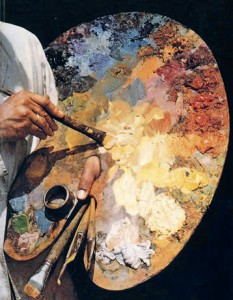 So what does showing look like? It is rarely replacing single lines like these with better written ones. Usually, it’s in trusting all the lines of imagery together to communicate. As a poet you’re a painter. Send the narrator in your head out for donuts and let the painter play. Your brush strokes are metaphors, rhythms, enjambment.
So what does showing look like? It is rarely replacing single lines like these with better written ones. Usually, it’s in trusting all the lines of imagery together to communicate. As a poet you’re a painter. Send the narrator in your head out for donuts and let the painter play. Your brush strokes are metaphors, rhythms, enjambment.
Try taking the “I” out, or at least dramatically reducing it. Part of this shift is realizing you’re no longer reporting on the exact experience you had, which would require including all the details you find significant. Instead, you’ve gotten in touch with the emotional core of your poem, separate from its inspiration. Now, what from your first draft serves that core? Write a whole new poem about the core. Blend the two? Keep serving the core.
Free yourself from conversational language, and for that matter, complete sentences.
I see lots of poems go off the rails because the writer is trying to maintain a charming narrative voice. Lose it. It doesn’t serve the core. Consider sentence fragments and catalogs of images–sets of three, usually. My favorite I enjoyed crafting is this set of three pairs from a poem about unrequited love:
Fox and mouse,
mouse and beetle, squirrel and squirrel.
Food,urges, panic.
Even the words added to ensure understanding aren’t a sentence. Brushstrokes.
If a writer…knows enough of what he is writing about he may omit things that he knows and the reader, if the writer is writing truly enough, will have a feeling of those things as strongly as though the writer had stated them. The dignity of movement of an iceberg is due to only one-eighth of it being above water. –Ernest Hemmingway
(Sorry for the gender invisibility. I’m in a hurry.)
How do you know if your show works, that readers understand your meaning? Poetry gets a bad rap from the public because people assume they won’t understand it. We certainly don’t want your work to add to that stereotype. And if editors can’t glean your meaning, you’re still not in print.
Trust and verify. Trust your audience. But as you’re learning, verify understanding.
Here’s where critique come in. Find poetry critique groups, locally or online Look for a truthful working group. Claps and nods are your local open mic aren’t telling you the truth. Find poetry readers, professors if you must, and ask them what your poem means. What confused them? Did they understand your core? If not, their misinterpretation is still helpful. Online, don’t just post your poem. Tell people what critique you want. “What does my poem mean? Where do I lose you?” Repeat this often, until you get a sense of how to communicate through showing, not telling.
Maybe you’re already published, even widely. So why should you change a groove that works for you? If you’re reading this because you’ve been declined by Califragile or JUMP, then my post can help you succeed with us in the future. Each journal is that editor’s sandbox. Other editors will have their own standards and pet peeves. Outlaw poets and MFA’s all contribute to the poetic conversation. Woody Guthrie and Beethoven are both considered geniuses. Their relationships to depth and craft were very different, and yet both served their cores.
Examples to Study:
Soapstone Figure by Nicole Michaels. Core: The objectification of women, the experience of being that object as the only experience you know.
A Lady by Amy Lowell. Core: Seeing and adoring a woman’s inner beauty and personhood.
Wolf 1061 by David Rodriguez. Core: Our home on Earth is perilous, fragile and rare. Our existence depends on it.
Looking Away at Lambert Airport by Beth Gordon. Core: In modern culture, we’re so plugged in, we’re detached from each other.
From the Ashes of a Poetry Journal, Two Phoenixes
Poets who connect with me via Califragile or The Seldom Herd Poetry & Goat Bulletin Board recently got my invitation to join Poetry Circle, an online journal and private membership critique group for experienced poets.
Shortly after I sent said invites, that publication was sold to a developer who shut down the journal and converted the critique forum to an automated message board with ads, removing all controls that allowed writers to edit or delete their previous work (and possibly future posts), or control whether their work is seen by the public.
That developer also ended the editor status, which included me. After issuing him a legal Cease and Desist Order to get him to comply with my requests that he remove all my content from the site, I joined other former editors and long time members in planning replacement sites that could be even better than what we had before.
Why two replacements? Was there a schism?
No, nothing so dramatic. One editor, Eliot Jacobson, had set up a forum site before he ever joined PC. It allowed him to jump right in and create something quickly, as quickly as things go that take endless hours, and so we have Jump, the International Journal of Modern Poetry. I’m working with him and other former PCers on that project.
Other editors wanted to take the slow route. They formed a group and are developing a site I’ll post about soon. I’m also involved with that group. In fact, there’s broad overlap in both.
Both groups will be similar in offering a place to post your poetry, away from the public (thus not considered published, keeping writing available for future submission) so that you can give and receive feedback. Both will have a public Front Page online journal that features selections from the forums as well as poems submitted and solicited from outside the group. Both will have a broad mission along the lines of helping poets improve their writing for the purpose of publication. Both will have the sense of community we enjoyed at PC.
Although we were dismayed at the sudden sale of PC, we knew the owner wanted to step down and was considering his options. So, surprised/not surprised. The result is that the PC community is able to improve upon the model in ways we couldn’t with the former owner. We’ll be able to have better coordination between the editors and better accountability in the community, creating a safer, more focused, troll-free zone.
My purpose in writing this note is to say to my Califragile & Seldom Herd communities, stay tuned. Wonderful choices are coming!
–Wren Tuatha
